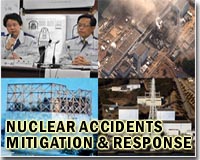| . |  |
. |
Tokyo (AFP) April 26, 2011 Japan said on Tuesday, the 25th anniversary of the Chernobyl nuclear disaster, that its six-week-old Fukushima nuclear crisis was "different in nature" from the events in Ukraine. Japan has ranked the tsunami-triggered disaster at Fukushima as a "major accident" with the maximum severity ranking of seven on an international scale, the same as Chernobyl, while stressing that it is less serious. "It is clear that the two cases are different in nature," said the government spokesman, Chief Cabinet Secretary Yukio Edano. "Unfortunately the amount of radioactive material leaked was about one-tenth (of Chernobyl), but at least we were able to avoid explosions of the reactors," he said on the day the world marked a quarter of a century since Chernobyl. He said Japan had been able to draw on some of the lessons of the disaster in Ukraine in dealing with its own crisis after a massive earthquake on March 11 sent a tsunami crashing into the plant, knocking out its cooling systems. "Studies and research based on Chernobyl on the impact on health have become an asset shared by all of humanity," Edano said, adding that such research had indirectly helped to inform Japan's evacuation orders. Japan has created a 20-kilometre (12-mile) no-go zone around the plant, where workers are dousing reactors and fuel rod pools with water to prevent the nuclear fuel inside from overheating and melting down. No-one has died so far from radiation in Japan, unlike in Chernobyl, where two workers were killed by the explosions on April 26, 1986, and 28 other rescuers and staff died of radiation exposure in the following months. Tens of thousands were evacuated and radioactive material blew into Belarus and Russia and further into western Europe. Controversy has raged for years over the number of deaths directly caused by the disaster, with estimates ranging from just dozens to tens of thousands. In Japan, plant operator Tokyo Electric Power (TEPCO) has said it expects to bring all six reactors at the stricken plant into "cold shutdown" by some time between October and January. TEPCO has faced a dilemma in its emergency operations -- having to douse the reactors with thousands of tonnes of water, while also struggling to safely dispose of the massive amounts of contaminated runoff. The company on Tuesday again sent a pair of crawler robots, the Packbot model made by US company iRobot, to examine areas around reactor one, where radiation from the rubble left by explosions is too high for humans to enter. Emergency crews, who have worked amid continued aftershocks, have injected nitrogen gas into the reactor one containment vessel to prevent another hydrogen explosion, after earlier blasts ripped away outer buildings. Tens of thousands of people around the plant have been evacuated, leaving homes and livelihoods behind. Cattle and other livestock have been roaming the no-man's land and were due to be culled. Hundreds of angry farmers from Fukushima prefecture protested Tuesday outside the Tokyo headquarter of TEPCO, taking with them vegetables, milk and even two cows affected by the atomic crisis. "TEPCO must stop the radiation leak! TEPCO must pay compensation! TEPCO must give us our hometown back!" demonstrators yelled in unison. A company official came out and apologised for causing "huge troubles" but stopped short of unveiling details of compensation. Prime Minister Naoto Kan, meanwhile, came under renewed pressure to resign over his handling of the crisis from both the conservative opposition and within his own centre-left Democratic Party of Japan. More than 60 DPJ lawmakers met to launch a fresh campaign to oust Kan, who took office last June, and former premier Yukio Hatoyama called for a meeting of all the party's MPs soon, which requires support from one-third of them. Media reports said that key members of the DPJ rebel faction are hoping to submit a motion to fire Kan as party chief, and therefore as prime minister, if he refuses to step down. The seismic disaster left more than 14,000 people dead and over 11,000 missing, while more than 100,000 are still staying at evacuation centres. Kan said he aims to make temporary housing units available by mid-August for all evacuees, pledging that "we will make all efforts so that everyone who wishes can move in by Obon," a Buddhist mid-summer festival where families honour the spirits of their departed ancestors. bur-si-mis-fz/slb
Share This Article With Planet Earth
Related Links Bringing Order To A World Of Disasters A world of storm and tempest When the Earth Quakes
 Chernobyl survivor warns of 'bombshell' in Japan
Chernobyl survivor warns of 'bombshell' in JapanTokyo (AFP) April 26, 2011 A survivor of the Chernobyl disaster says people exposed to radiation from Japan's crippled nuclear plant will spend the rest of their lives fearing the "bombshell" of cancer and other dire illnesses. Tuesday marks the 25th anniversary of the world's worst nuclear calamity and coincides with efforts to stop radiation seeping from the Fukushima plant after its cooling systems were knocked out ... read more |
|
| The content herein, unless otherwise known to be public domain, are Copyright 1995-2010 - SpaceDaily. AFP and UPI Wire Stories are copyright Agence France-Presse and United Press International. ESA Portal Reports are copyright European Space Agency. All NASA sourced material is public domain. Additional copyrights may apply in whole or part to other bona fide parties. Advertising does not imply endorsement,agreement or approval of any opinions, statements or information provided by SpaceDaily on any Web page published or hosted by SpaceDaily. Privacy Statement |